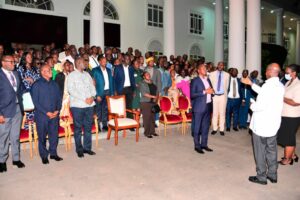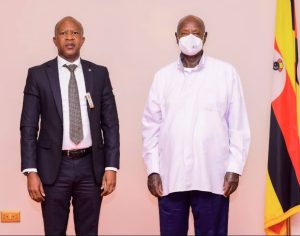State House, Entebbe –
President Yoweri Kaguta Museveni has sternly warned government officials against denying passports, national identity cards, and other official documents to Indigenous Banyarwanda, asserting that no one in government has the authority to determine who qualifies as Ugandan.
Speaking during a high-level meeting at State House yesterday, a visibly irritated Museveni condemned what he termed continued acts of discrimination and bureaucracy within key state institutions — despite his earlier directives aimed at ending such practices.
The meeting was attended by senior officials from the Ministry of Internal Affairs, the Directorate of Citizenship and Immigration Control, the National Identification and Registration Authority (NIRA), and a delegation from the Council for Abavandimwe (Indigenous Banyarwanda) led by social activist Frank Gashumba.

President Museveni saying off his gets (in black suit Frank Gashumba & in front row in a white shirt is Minister David Muhoozi
Among the officials present were Minister of State for Internal Affairs Gen. David Muhoozi, Permanent Secretary Lt. Gen. Joseph Musanyufu, Director of Citizenship and Immigration Control Maj. Gen. Apollo Kasiita Gowa, NIRA Executive Director Rosemary Kisembo, and Brig. Johnson Namanya Abaho, the Commissioner of Passport Control.
Defiance of Executive Order No. 1 of 2025
The meeting was convened following complaints from the Council for Abavandimwe that some officials at the Ministry of Internal Affairs were still defying Executive Order No. 1 of 2025, which was issued by the President earlier this year. The order explicitly bans discrimination against Indigenous Banyarwanda in the issuance of national documents and directs agencies to cease demanding proof of ancestry dating back to 1926 — a near-impossible standard for any Ugandan.
“The country didn’t have organized documentation until 2014 when national identity cards were introduced,” Museveni said. “So how do you expect anyone to produce records from 1926? That’s illogical!”
He further directed that decisions regarding a person’s citizenship should be confirmed by local leaders and community elders who are familiar with the individual, rather than bureaucrats based in Kampala.
A Legacy of Harassment and Lost Opportunities
For years, Indigenous Banyarwanda born and raised in Uganda have faced systemic discrimination, particularly when applying for passports and national IDs. Many were either denied these vital documents or were told to undergo naturalization — a process typically reserved for foreign nationals.
According to the Council for Abavandimwe, some applicants even had their documents confiscated, resulting in missed employment opportunities, scholarship offers, international medical treatment, and business deals.
The struggle to end this marginalization was spearheaded by Frank Gashumba, who petitioned numerous offices including the Inspector General of Police, Inspector General of Government, Uganda Human Rights Commission, Equal Opportunities Commission, Ministry of Internal Affairs, and Parliament. His persistence eventually reached President Museveni, who held a series of engagements that culminated in the issuance of the Executive Order.

Frank Gashumba meeting Museveni in one of the meetings to discuss these concerns
Museveni Orders Full Implementation
President Museveni emphasized that the purpose of the State House meeting was to ensure full and immediate implementation of the Executive Order. He reiterated that Indigenous Banyarwanda are as Ugandan as any other ethnic group and must be treated with the dignity and rights accorded to all citizens.
“There is no room for ethnic segregation in Uganda. Anyone born here and recognized by their community is Ugandan. Period,” the President asserted.
As the meeting concluded, all relevant government agencies were directed to comply with the Executive Order without further delay or excuses.







